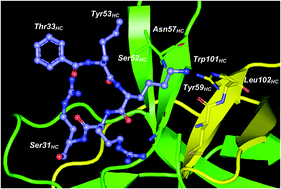Quantum binding energies of checkpoint CTLA-4 in complex with the immuno-oncological drug ipilimumab
Abstract
Inhibition of the checkpoint protein CTLA-4 by the US-FDA's approved monoclonal antibody ipilimumab has delivered breakthrough therapies against a wide range of cancers, being an important issue for clinical research. To date, many structural properties of this drug have been unveiled. However, the binding energy features of the receptor CTLA-4 in complex with its drug inhibitor, based on crystallographic data, need a deeper understanding. Within this context, by employing quantum chemistry we investigate in silico the binding energy features of the checkpoint protein CTLA-4 in complex with its drug inhibitor, highlighting the most relevant residue–residue interactions, looking for new insights into the mechanisms of pathway blockade to further engineer its affinity and selectivity. Our computational results not only give a better understanding of the binding mechanisms, but also point to an efficient alternative towards the development of antibody-based drugs, leading to new treatments for cancer therapy based upon immunotherapy.



 Please wait while we load your content...
Please wait while we load your content...